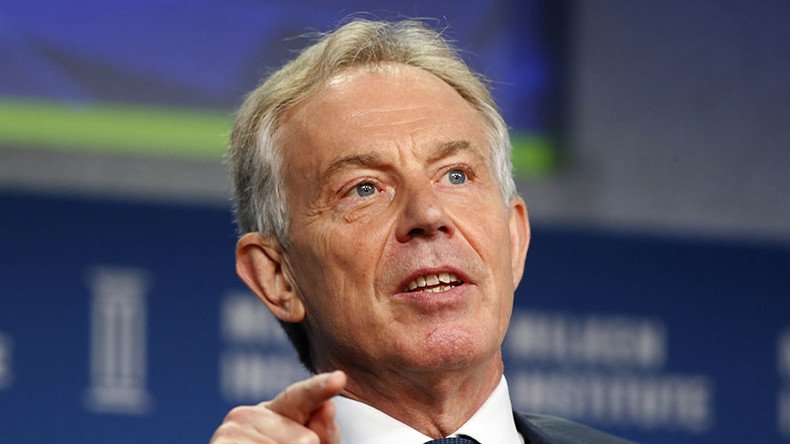Blair excluded MoD from strategic discussions on 2003 Iraq invasion

Senior officials in the Ministry of Defence (MoD) were excluded from talks in the run-up to Britain’s 2003 invasion of Iraq by former UK Prime Minister Tony Blair, an explosive new biography claims.
‘Broken Vows’ was authored by investigative journalist Tom Bower, and is due to be published later this month. Drawing from interviews with key sources, it paints a damning portrait of Blair’s conduct in and out of office.
In its pages, Bower alleges that the MoD was omitted from key discussions on Iraq despite the fact it is responsible for sending British troops on foreign missions.
Bower says that Sir Kevin Tebbit, the top civil servant in the MoD at the time of the invasion, phoned Blair’s foreign affairs adviser Sir David Manning to enquire why the MoD was being excluded from the conversation.
“How can you plan a war without the head of the Ministry of Defence?” Tebbit is quoted as asking Manning.
Manning reportedly replied: “We can’t have you because we would then have to include the permanent secretaries of the Foreign Office and DFID [the Department for International Development] and we don’t want Michael Jay [then permanent secretary at the Foreign Office] and Clare Short [the development secretary] involved.”
Bower said Blair rejected MoD advice about the movement of manpower and the supply of equipment prior to and after the invasion. He said that Blair did not want Tebbit’s advice because he would inevitably have challenged the former PM.
Blair benefited from classified intel while bidding for contracts, new biography claims https://t.co/rhDDgxGy6Qpic.twitter.com/qj7Xdpmuho
— RT UK (@RTUKnews) March 1, 2016
Bowers went on to suggest that Britain’s Iraq policies were wrought from the heart of Number 10 and Blair preferred to speak to Britain’s then-Defense Secretary Geoff Hoon about the war.
Although Hoon was included in the discussions, Bowers notes his involvement was also limited.
“Unlike education or the NHS, Blair cared little about defense and, as Hoon discovered, never discussed detail,” Bowers wrote.
“Blair’s detachment meant he resisted providing the services with sufficient money to fulfil their task, thus scuttling the military’s inviolability.”
‘Broken Vows’ explores Blair’s decade in power, his resignation from the prestigious role of Middle East peace envoy and the commercial empire he constructed advising tyrants and tycoons in the Middle East, Asia and elsewhere.
In scrupulous detail, Bowers uncovers how Blair “blurred” the lines between his commercial interests and charity work, was branded pro-Israel while occupying the role of Middle East peace envoy, and benefitted from classified intelligence data while hunting for lucrative business deals with far-flung regimes.
Bowers also notes that Blair accepted money from questionable sources. A firm called PetroSaudi reportedly paid the former PM £41,000 (US$58,000) per month and a 2 percent commission on each contract he brokered with wealthy Chinese officials. However, the lucrative arrangement came to a close after Blair was accused of bribing Malaysian officials.
The former Labour PM also brokered a £20 million contract to conduct a review of the Kuwaiti economy, according to the book. Remarkably, Kuwait’s government was so irked by Blair’s findings it buried the review.












